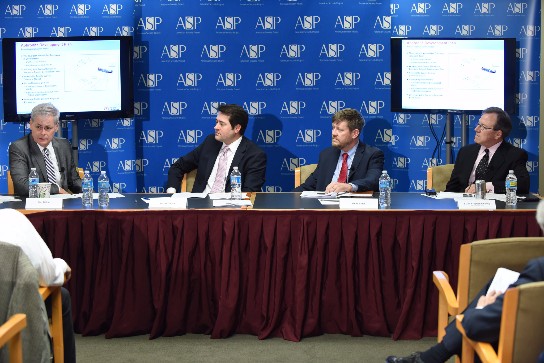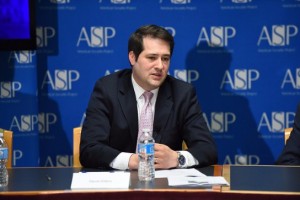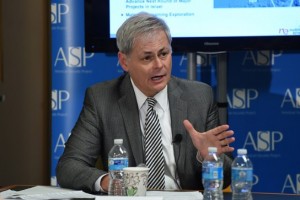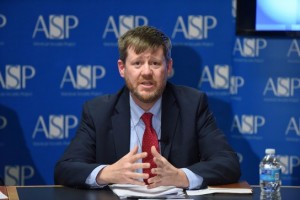
Geopolitics of Energy in the Eastern Mediterranean: Panel 3 Recap
Podcast: Play in new window | Download
Subscribe: Apple Podcasts | RSS
In ASP’s Geopolitics of Energy Security in the Eastern Mediterranean event’s final panel, ASP hosted Steve Lutes of the US Chamber of Commerce, David Gillers of the US Senate Committee on Energy and Natural Resources, and Ben Dillon, VP of Communications and Government Relations for Noble Energy. The panel discussed the US interests in the Eastern Mediterranean and its role in promoting energy cooperation and investment opportunities.
David Gillers spoke first on the US’ role in promoting regional stability through energy investments and projects. He emphasized the commercial and strategic aspects of US interests in the region. Commercially, Gillers said the US is “interested in American companies succeeding abroad” through initiatives like trade agreements and export promotion. Strategically, regional stability was key:
“The Eastern Mediterranean is an area of the world where regional dynamics are very delicately balanced. The US should take any opportunity to strengthen or balance commercial ties for matters of regional stability.”
Gillers spoke on the ability of these energy initiatives to promote regional cooperation. He cited the recent letter of intent signed between Israel and Jordan for a pipeline that would run between the two countries, the first cross-border project since the 1994 peace accords. Gillers was clear:
“Energy is a very special commodity. It’s the great equalizer.”
Ben Dillon spoke next, focusing on Noble Energy’s role in Eastern Mediterranean energy. Current Israeli domestic political issues have stifled Noble’s progress in the country, where the company wants to provide excess gas from Tamar field- Israel’s only currently producing field- to Egypt and Jordan. Tamar field also provides half of Israel’s electric power and Dillon refers to the project as an “amazing example of what can occur when all the pieces come together.”
Anti-trust and energy tax issues are among several obstacles facing Noble at present day. Dillon reaffirmed the company’s commitment to cooperating with Isreal, however, saying they “look forward to working with the new government.” Addressing these issues will be key in bringing in other investors. As Dillion notes:
“Capital needs confidence and confidence must be earned.”
Steve Lutes of the US Chamber of Commerce spoke last, outlining the prospects for US and regional business partners via energy cooperation:
“Increased regional cooperation [in the Eastern Mediterranean] creates a better business environment for the US across all sectors, not just energy.”
Lutes also discussed the importance of working toward interests for the region in addition to the US. Increased cooperation and an emphasis on energy diplomacy can increase revenues and create jobs for these regional governments. It can bring stability.
“We support this idea of energy cooperation and are working not only with our own government but also with Israel, Egypt, Jordan, Turkey and elsewhere.”








